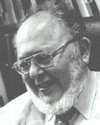June 21, 2005
Masters of War
During the 1950s, Herman Kahn was part of the RAND Corporation's cadre of hyper-rational authorities on nuclear war, who was paid to ask, "what if?" What if the Soviet Union lobbed a few nuke-studded missiles our way? What if they struck first? Second? His book on the subject was based on two assertions: "The first is that nuclear war is possible; the second is that it is winnable," and churned the stomachs of many readers for the calm manner in which he laid out the aftermath of nuclear winter:

The most infamous pages in "On Thermonuclear War" concern survivability. What makes nuclear war different, Kahn points out, is not the number of dead; it's a new element—the problem of the postwar environment. In Kahn's view, the dangers of radioactivity are exaggerated. Fallout will make life less pleasant and cause inconvenience, but there is plenty of unpleasantness and inconvenience in the world already. "War is a terrible thing; but so is peace," he says. More babies might have birth defects after a nuclear war, but four per cent of babies have birth defects anyway. Whether we can tolerate a slightly higher percentage of defective children is a question of trade-offs. "It might well turn out," Kahn suggests, "that U.S. decision makers would be willing, among other things, to accept the high risk of an additional one percent of our children being born deformed if that meant not giving up Europe to Soviet Russia."Of course, the whole purpose of his book was less to inform than simply to exist, to have certain illocutionary effects. In order for deterrence to be a credible strategy, the Soviet Union had to believe that we were actually crazy enough to fight—and accept the costs of—the worst of nuclear apocalypses, and that's where thinkers like Kahn came in. Reading about his life and thought, it's impossible to believe that there weren't people genuinely crazy enough to try to win a nuclear war. Which was, I suppose, what they wanted Moscow to believe. (I believe Mao Tse-Tung once made a similar threat, noting that if 200 million Americans died in an atomic exchange, that would mean the end of the United States; 200 million dead Chinese would be a mere blip on the radar.)
The book proposes a system for labelling contaminated food so that older people will eat the food that is more radioactive, on the theory that "most of these people would die of other causes before they got cancer."
Now the interesting, and maybe less appalling, question is whether a similar deterrence strategy could work today, against terrorism. What if the United States made it clear that September 11-type attacks were no big deal. What if the general tenor of national security discourse ran: "Okay, well even 12,000 or 20,000 dead is tragic, but life will go on, and society won't collapse." Would that change anything? Say I'm a terrorist trying to achieve X amount of terror; ideally I'd like to do it in the cheapest way possible—perhaps by exploding a suicide bomb in a mall. But if I know that American society is perfectly willing to absorb a minor attack like that, then the stakes are raised. A bomb in a mall would be useless. To achieve X amount of terror, I would have to go blow up a chlorine tank or something. Or try to get my hands on a nuclear suitcase. If America had a cavalier attitude towards terrorist attacks—rather than the fairly frantic one we do have—would that persuade some terrorists to try to up the ante and think up even more deadly attacks, or it would it discourage some terrorists from even trying? ("What's the point, Americans can't be terrorized.") There may be some terrorists who would like to set off a nuclear bomb in Times Square regardless of our opinion on the matter; but surely there are some terrorists who respond to incentives, no?
